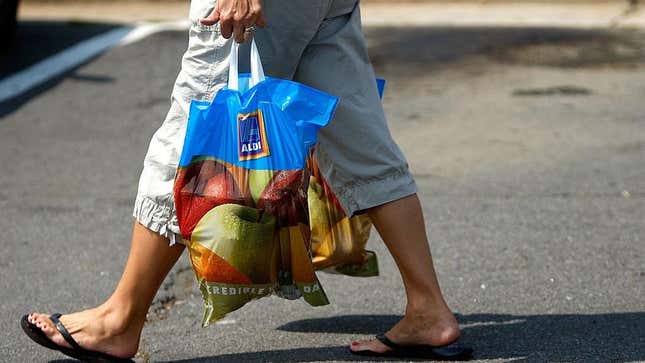
ALDI has garnered global attention this week after pictures surfaced on Twitter showing that in the UK, the retailer has added serious security tags to the most basic of items, including cheese and meat. Twitter user @wheelswordsmith posted photos on Wednesday that show cheese with black wraparound security tags and steak enclosed in full-on clear security boxes, akin to the ones you’d see on video games.
The cheese is priced at £3.99, or about $4.79. According to a report by Business Insider, this type of security tagging isn’t limited to ALDI stores in the UK:
One Sainsbury’s that Insider visited in London had security stickers on a wide range of items. These included many medical, healthcare, and beauty products, such as hay fever tablets, disposable face masks, plasters, mouthwash, hair wax, and toothpaste, as well as bars of Cadburys and Lindt chocolate. “To maintain great prices, these products have been protected with a security device,” one sign in the store said.
Though the new security measures for the cheese and meat are the most conspicuous we’ve seen, security tags at ALDI aren’t unprecedented. In 2020, Reddit user bubblecoffee asked why they set off an alarm leaving ALDI half the time they go shopping there. “I usually just buy steaks and beef they always wave me on to just go,” they wrote.
“Steaks and other high-value items have sensors,” replied someone who identified themselves as an employee. “Sometimes they do not get deactivated.”
So far, sightings of the Best Buy–style tags haven’t been reported here in the US. I went to my local ALDI in southern Vermont this morning to check it out, and there weren’t any tags on the groceries, or at least no obvious ones. But that doesn’t mean ALDI isn’t taking similar measures here.
In April, Reddit user u/Diotima245 posted a picture of an empty shelf at ALDI with a sign that reads, “Due to high theft we can no longer put steaks on the shelf. Please ask associates if needed. Thank you.” In small text below it, it says, “Sorry for the inconvenience.” In the comments below the post, several other users in the US shared that meat and other items are locked up their stores, too, including at retailers like Walmart.
This all comes at a time when the UK is experiencing historic inflation. Shoplifting, particularly with regard to food, has been a focus in recent months. In May, the UK’s chief inspector of constabulary said officers should “use discretion” when deciding whether to punish people for shoplifting for food at a time when the cost of living has risen considerably. It’s understandable, then, that grocery stores would try to mitigate inventory loss by making theft harder to get away with in the first place. But who wants to enter and spend money in a place where they’re considered guilty until proven innocent?
Taking these security measures to their logical endpoint, if every single item eventually ends up behind glass, requiring the aid of an employee to obtain anything and everything on our grocery lists, and all these same stores are already dealing with a shortage of employees who can assist us, then the simple act of grocery shopping will become an undue burden on customers, many of whom can’t shoulder the fees associated with an alternative like grocery delivery. The security tags system seems to be a compromise solution, allowing shoppers autonomy while protecting inventory. Maybe just don’t think too hard about the fact that your steaks weren’t always purchased in a lock box.